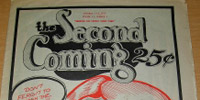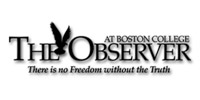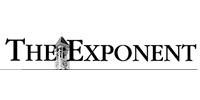College newspapers offer a great forum for exploration of the news and opinion, but as with all forums of information, eventually, someone is going to say something that others don’t like. In these controversial college newspapers, we’ll take a look at incidents, opinions, and actions that set things on fire within the college community and beyond. Whether it’s seemingly obscene photos or personal attacks, these college newspapers push the line and the boundaries of free speech.
-
University of North Florida Spinnaker
 The Spinnaker at the University of North Florida’s ran a thoughtful article on HPV’s spread through oral sex, highlighting a health threat that’s prevalent on college campuses. But it’s not the article itself that garnered attention for the paper, rather, it was the controversial cover that the student newspaper ran to highlight the piece. The cover featured a photo of a simulated oral sex act, and was met with mixed reactions from students and others in the community. One student believed the cover to be “too risque,” while another shared, “I like it. I think it’s offensive, but I like it.” Spinnaker editor Josh Gore defended the cover, explaining, “HPV is a problem everywhere. It’s happening, and that’s why we put it on the cover. This is not obscene. This is not obscene at all.” The newspaper is partially funded by the student government, and those funds were frozen for three days after the controversial cover was released. However, University of North Florida faculty was quick to point out that as an independent newspaper, The Spinnaker is not subject to the university’s dictation of what can be on the cover.
The Spinnaker at the University of North Florida’s ran a thoughtful article on HPV’s spread through oral sex, highlighting a health threat that’s prevalent on college campuses. But it’s not the article itself that garnered attention for the paper, rather, it was the controversial cover that the student newspaper ran to highlight the piece. The cover featured a photo of a simulated oral sex act, and was met with mixed reactions from students and others in the community. One student believed the cover to be “too risque,” while another shared, “I like it. I think it’s offensive, but I like it.” Spinnaker editor Josh Gore defended the cover, explaining, “HPV is a problem everywhere. It’s happening, and that’s why we put it on the cover. This is not obscene. This is not obscene at all.” The newspaper is partially funded by the student government, and those funds were frozen for three days after the controversial cover was released. However, University of North Florida faculty was quick to point out that as an independent newspaper, The Spinnaker is not subject to the university’s dictation of what can be on the cover. -
Notre Dame Observer
 Freedom of speech is fiercely defended in college newspapers and beyond. But messages of hate are not covered under the First Amendment, and The Observer at Notre Dame found itself printing a hateful joke about gay bashing. In a newspaper cartoon, violence against gays was joked about, with a conversation between a saw and a man. The saw asks, “What is the easiest way to turn a fruit into a vegetable?” The man responds with, “No idea,” and the saw answers, “A baseball bat.” The creators of the cartoon apologized for their misguided joke, calling it “offensive, distasteful, and completely humorless.” They shared that the cartoon was intended to highlight the intolerance of homosexuality at Notre Dame, but the cartoon clearly went too far, and was not received as it was intended. The reaction to the cartoon was swift and outspoken, with several people contacting GLAAD. The organization requested that The Observer review their editing policies. Even Notre Dame president Rev. John Jenkins weighed in with a statement, writing, “The University denounces the implication that violence or expressions of hate toward any person or group of people is acceptable or a matter that should be taken lightly.” Former assistant managing editor Kara King resigned as a result of the incident, apologizing and admitting that she was “solely responsible for providing a forum for this message of hate.”
Freedom of speech is fiercely defended in college newspapers and beyond. But messages of hate are not covered under the First Amendment, and The Observer at Notre Dame found itself printing a hateful joke about gay bashing. In a newspaper cartoon, violence against gays was joked about, with a conversation between a saw and a man. The saw asks, “What is the easiest way to turn a fruit into a vegetable?” The man responds with, “No idea,” and the saw answers, “A baseball bat.” The creators of the cartoon apologized for their misguided joke, calling it “offensive, distasteful, and completely humorless.” They shared that the cartoon was intended to highlight the intolerance of homosexuality at Notre Dame, but the cartoon clearly went too far, and was not received as it was intended. The reaction to the cartoon was swift and outspoken, with several people contacting GLAAD. The organization requested that The Observer review their editing policies. Even Notre Dame president Rev. John Jenkins weighed in with a statement, writing, “The University denounces the implication that violence or expressions of hate toward any person or group of people is acceptable or a matter that should be taken lightly.” Former assistant managing editor Kara King resigned as a result of the incident, apologizing and admitting that she was “solely responsible for providing a forum for this message of hate.” -
Reed College’s The Quest
 At Reed College, students have access to The Quest, a student newspaper that is admittedly “rated R,” featuring how-to articles on dropping acid, as well as photographs of naked men. It is for this reason that Reed College has denied the newspaper a link on its official website. The college assures critics that it is not censoring the newspaper, rather, they are guaranteeing the students freedom of speech by not putting it online. It’s a confusing explanation that not everyone is buying, but Reed College spokeswoman Harriet Watson defends the action, sharing that by putting the newspaper online, the college would become the publisher, and “as publishers, we would, out of necessity, exercise oversight for what would bear the imprimatur of the college.” Despite this controversy, the college does support The Quest‘s hard-copy existence, and encouraged the editors to share the newspaper online, just not through the official college website. Free speech activists are not satisfied, including Student Press Law Center lawyer Michael Hiestand, who comments, “They don’t want a wider audience to see what the students have written.”
At Reed College, students have access to The Quest, a student newspaper that is admittedly “rated R,” featuring how-to articles on dropping acid, as well as photographs of naked men. It is for this reason that Reed College has denied the newspaper a link on its official website. The college assures critics that it is not censoring the newspaper, rather, they are guaranteeing the students freedom of speech by not putting it online. It’s a confusing explanation that not everyone is buying, but Reed College spokeswoman Harriet Watson defends the action, sharing that by putting the newspaper online, the college would become the publisher, and “as publishers, we would, out of necessity, exercise oversight for what would bear the imprimatur of the college.” Despite this controversy, the college does support The Quest‘s hard-copy existence, and encouraged the editors to share the newspaper online, just not through the official college website. Free speech activists are not satisfied, including Student Press Law Center lawyer Michael Hiestand, who comments, “They don’t want a wider audience to see what the students have written.” -
American University Eagle
 American University’s Eagle published an article, “Dealing With AU’s anti-sex brigade,” written by Alex Knepper, who called out American University’s feminists and gay activists as “a sniveling bunch of emotional cripples.” Knepper criticized anti-rape feminists in particular, who he believes are responsible for killing the excitement of sexual exploration by “abolish[ing] its passion” with “contract-signing.” In the article, Knepper admits he’s been called a rape apologist for his views, and critics of this particular article agree. In fact, one person (or persons) on campus went so far as to remove copies of the paper from several newsstands, putting a message above them: “NO ROOM FOR RAPE APOLOGISTS.” No newspapers were destroyed, but the message of action was clearly against Knepper’s printed views. According to AU student activist K. Travis Ballie, Knepper’s article isn’t the first example of rape controversy, writing, “The Eagle has repeatedly refused for months to show adequate sensitivity, compassion, and common decency” to rape survivors. The Eagle was disappointed by the reaction, sharing that “we were happy when people started talking about and criticizing this column, but it’s upsetting when it devolves into a kind of vandalism situation.”
American University’s Eagle published an article, “Dealing With AU’s anti-sex brigade,” written by Alex Knepper, who called out American University’s feminists and gay activists as “a sniveling bunch of emotional cripples.” Knepper criticized anti-rape feminists in particular, who he believes are responsible for killing the excitement of sexual exploration by “abolish[ing] its passion” with “contract-signing.” In the article, Knepper admits he’s been called a rape apologist for his views, and critics of this particular article agree. In fact, one person (or persons) on campus went so far as to remove copies of the paper from several newsstands, putting a message above them: “NO ROOM FOR RAPE APOLOGISTS.” No newspapers were destroyed, but the message of action was clearly against Knepper’s printed views. According to AU student activist K. Travis Ballie, Knepper’s article isn’t the first example of rape controversy, writing, “The Eagle has repeatedly refused for months to show adequate sensitivity, compassion, and common decency” to rape survivors. The Eagle was disappointed by the reaction, sharing that “we were happy when people started talking about and criticizing this column, but it’s upsetting when it devolves into a kind of vandalism situation.” -
Johns Hopkins University’s The Carrollton Record
 In 2008, Johns Hopkins removed student-run newspaper The Carrollton Record from the dorms, citing school policy. According to school spokesman Dennis O’Shea, the only publication approved for distribution in the residential halls is the JHU News-Letter, the official student newspaper. But critics believe this is only a convenient excuse to quiet the opinion of The Carrollton Record, a controversial paper that has made news for criticizing the JHU administration, including a decision to allow a gay porn director on campus for a pro-porn, pro-condom address.
In 2008, Johns Hopkins removed student-run newspaper The Carrollton Record from the dorms, citing school policy. According to school spokesman Dennis O’Shea, the only publication approved for distribution in the residential halls is the JHU News-Letter, the official student newspaper. But critics believe this is only a convenient excuse to quiet the opinion of The Carrollton Record, a controversial paper that has made news for criticizing the JHU administration, including a decision to allow a gay porn director on campus for a pro-porn, pro-condom address. -
Eastern Michigan University’s The Second Coming
 In the summer of 1969, The Second Coming was created on the campus of Eastern Michigan University. It only lasted about five years before being banned on campus and resulting in the firings of professors and expulsions of students. The Second Coming caused a lot of trouble in its short life, calling EMU a slumlord for overloading the dorms and sharing outrageous satire over a bathing suit homecoming queen contest, which is what ultimately shut down the paper. Threats of lawsuits were issued, and although no one ever took the paper to court, faculty members involved with the paper were purged. These “purge professors” went to federal court, winning a substantial settlement from the university.
In the summer of 1969, The Second Coming was created on the campus of Eastern Michigan University. It only lasted about five years before being banned on campus and resulting in the firings of professors and expulsions of students. The Second Coming caused a lot of trouble in its short life, calling EMU a slumlord for overloading the dorms and sharing outrageous satire over a bathing suit homecoming queen contest, which is what ultimately shut down the paper. Threats of lawsuits were issued, and although no one ever took the paper to court, faculty members involved with the paper were purged. These “purge professors” went to federal court, winning a substantial settlement from the university. -
Boston College’s The Observer
 In 1998, The Observer at Boston College ceased publication on campus. In its time, it covered controversial issues with a conservative slant, including anti-abortion and pro-war sentiments. At its end, The Observer ran a cartoon questioning, “Which one kills more blacks?” among a Nazi Rally, members of the KKK, and a Planned Parenthood clinic. In 2003, the paper returned, with the same controversial conservative view. Coming back again, the paper ran a story on “Racism in the BC Housing Policy,” a piece that suggested campus housing was using race in its selection process, as well as a piece with criticism of the presence of homosexuality on campus. Reaction to the paper was mixed, with some people loving it and others hating it, with editor-in-chief Chris Pizzo indicating that the majority of what they’ve gotten back had not been positive. Students like Joe Competello “don’t mind that they put a conservative voice on this campus,” but find the coverage a bit offensive. Still, others like student Robert Daly appreciated that The Observer didn’t “tiptoe around the issues.”
In 1998, The Observer at Boston College ceased publication on campus. In its time, it covered controversial issues with a conservative slant, including anti-abortion and pro-war sentiments. At its end, The Observer ran a cartoon questioning, “Which one kills more blacks?” among a Nazi Rally, members of the KKK, and a Planned Parenthood clinic. In 2003, the paper returned, with the same controversial conservative view. Coming back again, the paper ran a story on “Racism in the BC Housing Policy,” a piece that suggested campus housing was using race in its selection process, as well as a piece with criticism of the presence of homosexuality on campus. Reaction to the paper was mixed, with some people loving it and others hating it, with editor-in-chief Chris Pizzo indicating that the majority of what they’ve gotten back had not been positive. Students like Joe Competello “don’t mind that they put a conservative voice on this campus,” but find the coverage a bit offensive. Still, others like student Robert Daly appreciated that The Observer didn’t “tiptoe around the issues.” -
UCSD Koala
 Some controversial college newspapers embrace their reputation to share controversial social and political views, and some become controversial by doing shocking things. The UCSD Koala fell into the latter category when they hurtfully targeted student Carli Thomas in the newspaper by running an obscene photo and headline. The photo showed male genitalia in Thomas’ face, as well as a headline reading, “Carli Thomas is a fat whore.” Thomas was obviously embarrassed by the photo and headline, which was a personal attack on her. Thomas believes that she was targeted due to her decision as student body leader to cut funding for The Koala. This is not the first time The Koala has printed something offensive, as the paper’s official “purpose” is to “crush all your hopes and dreams with comedy,” making jokes about September 11th within days of the event and engaging in equal opportunity mocking, blasting student sexual orientation, people with disabilities, race, and religion. UCSD local news outlet KGTV San Diego attempted to interview The Koala editor Kris Gregorian about the incident with Thomas, but Gregorian refused to do an interview without first being paid with a case of beer.
Some controversial college newspapers embrace their reputation to share controversial social and political views, and some become controversial by doing shocking things. The UCSD Koala fell into the latter category when they hurtfully targeted student Carli Thomas in the newspaper by running an obscene photo and headline. The photo showed male genitalia in Thomas’ face, as well as a headline reading, “Carli Thomas is a fat whore.” Thomas was obviously embarrassed by the photo and headline, which was a personal attack on her. Thomas believes that she was targeted due to her decision as student body leader to cut funding for The Koala. This is not the first time The Koala has printed something offensive, as the paper’s official “purpose” is to “crush all your hopes and dreams with comedy,” making jokes about September 11th within days of the event and engaging in equal opportunity mocking, blasting student sexual orientation, people with disabilities, race, and religion. UCSD local news outlet KGTV San Diego attempted to interview The Koala editor Kris Gregorian about the incident with Thomas, but Gregorian refused to do an interview without first being paid with a case of beer. -
Purdue University’s The Exponent
 At Purdue University, The Exponent shares a “sex position of the week” every Friday, presumably for students to try out over the weekend. Some readers might find that offensive enough, but The Exponent‘s real mistake came when they ran one particular sex position, which they called “The Prestige.” It depicted a couple having sex, then switching out the first man with another one without the woman’s knowledge. It may have been funny at the time, but critics were quick to point out that the cartoon was essentially suggesting rape. Students Against Abuse called out the paper for “creating an unsafe environment” for female Purdue students by “depicting females as sexual objects, whose victimization is viewed as a source of entertainment.” The next day The Exponent issued an apology for the cartoon, explaining that the paper didn’t mean to “condone non-consensual sexual situations” and admitting, “we are absolutely in the wrong on this one.”
At Purdue University, The Exponent shares a “sex position of the week” every Friday, presumably for students to try out over the weekend. Some readers might find that offensive enough, but The Exponent‘s real mistake came when they ran one particular sex position, which they called “The Prestige.” It depicted a couple having sex, then switching out the first man with another one without the woman’s knowledge. It may have been funny at the time, but critics were quick to point out that the cartoon was essentially suggesting rape. Students Against Abuse called out the paper for “creating an unsafe environment” for female Purdue students by “depicting females as sexual objects, whose victimization is viewed as a source of entertainment.” The next day The Exponent issued an apology for the cartoon, explaining that the paper didn’t mean to “condone non-consensual sexual situations” and admitting, “we are absolutely in the wrong on this one.” -
University of Illinois Daily Illini
 The Daily Illini at the University of Illinois has come under fire as anti-Semitic for several items, including a comic strip. The strip in question depicted a character who wanted to make a “Jew joke,” but felt he was unable because he didn’t want “Isiah down at the bank to beat me with his nose.” Although editors deemed the cartoon too offensive to run, it made it into the paper on accident due to problems in the paper’s production process, ending up in 20,000 student paper copies. In response, the university acted with a meeting to go over the quality of the paper to ensure a positive experience for readers and students. The Daily Illini has also been involved in the Jyllands-Posten controversy, which involved the paper printing controversial cartoons that had previously led to protests and riots around the world. Following that incident, The Daily Illini published a salary guide for the campus, sharing the salaries of the president, professors, and more. The paper has no official university ties, however, there are professors on the board of directors.
The Daily Illini at the University of Illinois has come under fire as anti-Semitic for several items, including a comic strip. The strip in question depicted a character who wanted to make a “Jew joke,” but felt he was unable because he didn’t want “Isiah down at the bank to beat me with his nose.” Although editors deemed the cartoon too offensive to run, it made it into the paper on accident due to problems in the paper’s production process, ending up in 20,000 student paper copies. In response, the university acted with a meeting to go over the quality of the paper to ensure a positive experience for readers and students. The Daily Illini has also been involved in the Jyllands-Posten controversy, which involved the paper printing controversial cartoons that had previously led to protests and riots around the world. Following that incident, The Daily Illini published a salary guide for the campus, sharing the salaries of the president, professors, and more. The paper has no official university ties, however, there are professors on the board of directors.
No comments:
Post a Comment